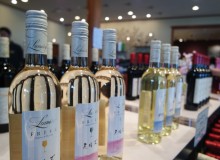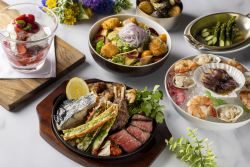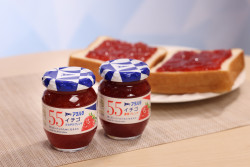
February 15, 2013
Exotic Pantries
Tokyo’s independent markets hold a feast of rare eats
By Metropolis
Originally published on metropolis.co.jp on February 2013

When thinking about shopping for foreign groceries, the largest retail contenders, the twin “N’s” in Azabu-Juban and Roppongi, might spring to mind. But next time you’re looking for lamb or lentils, check out one of these independent grocers instead. Support these small businesses and think of it as your own contribution to the consumer revolution.
Al-Flah has an unassuming shop front, like most of the stores featured here. But once you’re inside, the store is amazingly well organized and stocked with a variety of multicultural products to make your head spin.
Established in 1987, the staff are proud of the store’s history as the first halal shop in Tokyo. Mr. Shahzad, who has served as the affable manager for about ten years, attributes many of his long-term customers to the store’s word-of-mouth reputation. Often, he says, customers come in for the first time and become regular faces, friends he sees again and again.
Al-Flah’s specialties include Middle Eastern and African products in addition to more typical Asian items. Over 10 varieties of dried legumes are sold by the kilo with the store’s branding on the bag, and double the number of bulk spices is available in various sizes. The store also has a “low-price guarantee” for its products. A one-kilogram bag of lentils will only set you back ¥300, while most spices are even cheaper. Shahzad sings the praises of Saudi Arabian dates, a highly popular product, along with 100% pure pomegranate juice from Iran that retails for a quarter of the price you’d find in most Tokyo outlets.
Lamb lovers will be pleased to find one of Tokyo’s few vendors. The frozen meats selection, most from Australia or Brazil, has every edible sheep part imaginable on offer, from minced mutton to leg shank to… gulp, brain. Apparently lamb cerebrum is an increasingly popular delicacy—though who’s eating it we’re not quite sure. Apart from edible goodies, shoppers suffering from unruly manes need look no further than the African cosmetics section. And Bollywood cinephiles can browse through an entire dedicated section of the store.
Take Ikebukuro exit C9 (west side) and the shop is right next to the Royal Hotel. For those living within the city limits, free delivery is available for online orders over ¥9,999.
4F Ohnoya Bldg, 2-41-2 Ikebukuro, Toshima-ku. Tel: 03-3985-9784. Open daily 11am-11pm. Nearest stn: Ikebukuro. www.al-flah.com

In a quiet residential zone it can be hard to miss the blinking lights and bright orange storefront of Asian Bazaar once your GPS (or a phonecall to the store) has guided you to the street. Contrary to the image conjured by its name, Asian Bazaar is a tiny shop. It stocks mainly dry goods, such as Pillsbury wheat flour for ¥300 to make naan and chapati, legumes, box curry/meal mixes and plenty of canned and bottled condiments. As the shop mostly caters to the Indian and Indonesian community, the small frozen section stocks essentials such as paneer cheese by the kilo (¥1,200), samosas (¥650) and other ready-to-eat food, which the staff says are the most popular.
A family-run affair, you’ll find Mirza Ilyas Baig or his wife manning the till of Asian Bazaar most days. The physical store has only been open two years, but the online shop draws a large part of the store’s business. For those in Shinagawa, Minato or Ota wards, same-day shipping is complimentary on orders over ¥5,000. Residents of other parts of Kanto can get free delivery for orders above ¥8,000.
2-9-3 Higashi Oi, Shinagawa-ku. Tel: 03-6386-6038. Open daily 11am-10pm. Nearest stn: Oimachi (west exit). www.asianbazaar.co.jp

Mundo Latino has its roots in music. The company that owns the store, ASC Co., began an import business in 1993, primarily bringing in Colombian goods for the once-thriving Latino community in Tokyo. The company issued a mail-order catalogue and was overwhelmed by CD requests from immigrants craving the sounds of home. When the team decided to open Mundo Latino in 2000, they responded to a different desire—for hard-to-find foodstuffs from South America.
About 50% of Mundo Latino’s clientele are Japanese. The staff, most of whom have worked there for over a decade, strive to introduce Latin foods and culture to curious locals. Printouts of popular recipes are on hand (in Japanese) and employees like Sabrina Eiguchi are happy to help those who want to try something new.
The product selection focuses on tropical fruits and vegetables sold in frozen, ready-to-defrost-and-eat packs to individual consumers and restaurants. Fruits you may never have heard of such as guanabana and mora, a type of Andean berry, are sold as purees. The store currently has a small counter with three seats and will make you a batido (fruit shake) to order if you want to linger, with milk (¥315) or without (¥367). Fresh plantains (from ¥200), Brazilian chorizo (around ¥1,000) and even quinoa (¥645) can be found on the shelves. More items are available through mail-order than what you see in the store, so browse the brochures on the wall, next to a signed poster of Shakira. You can also shop online to see the full range.
The store is currently in a transitional phase, expanding the frozen section and possibly establishing a snack table, to foster more of a community meeting spot for Latin enthusiasts and homesick South Americans.
3F Ochiai Bldg, 1-12-12 Higashi-Gotanda, Shinagawa-ku. Tel: 03-6408-0748. Open Tue-Sun 10am-7pm, closed Mon. Nearest stn: Gotanda (east exit). www.nambei.com/ja







